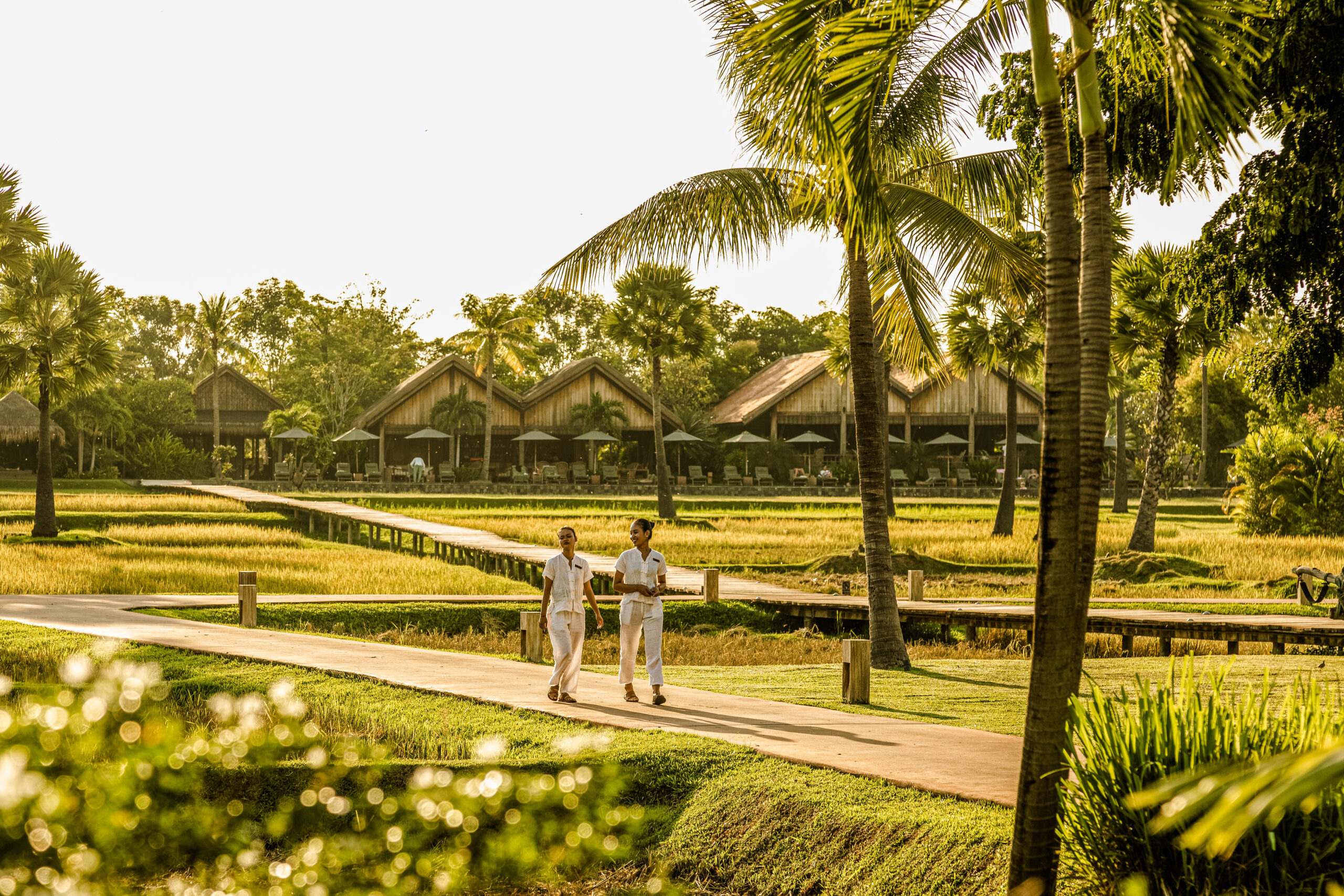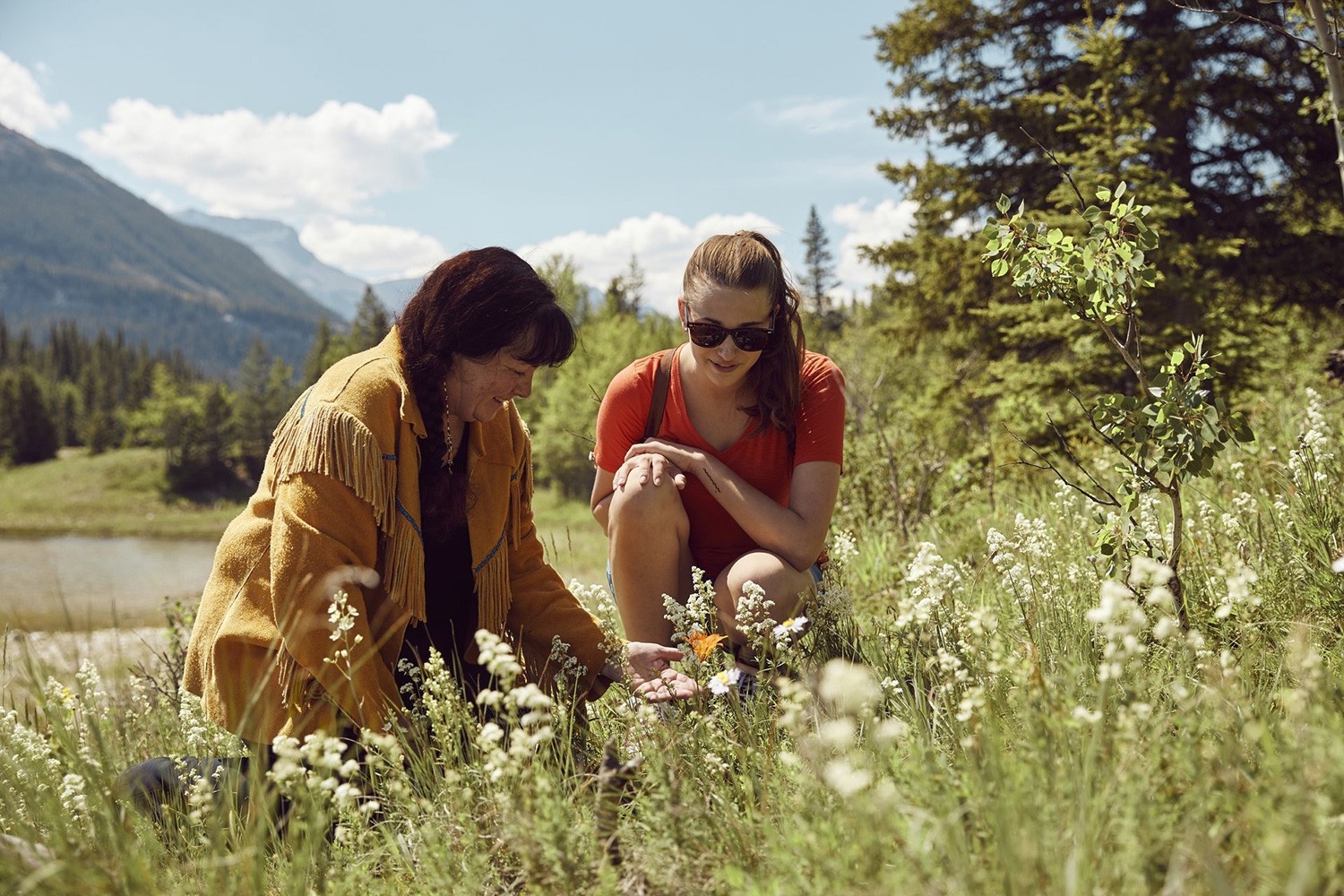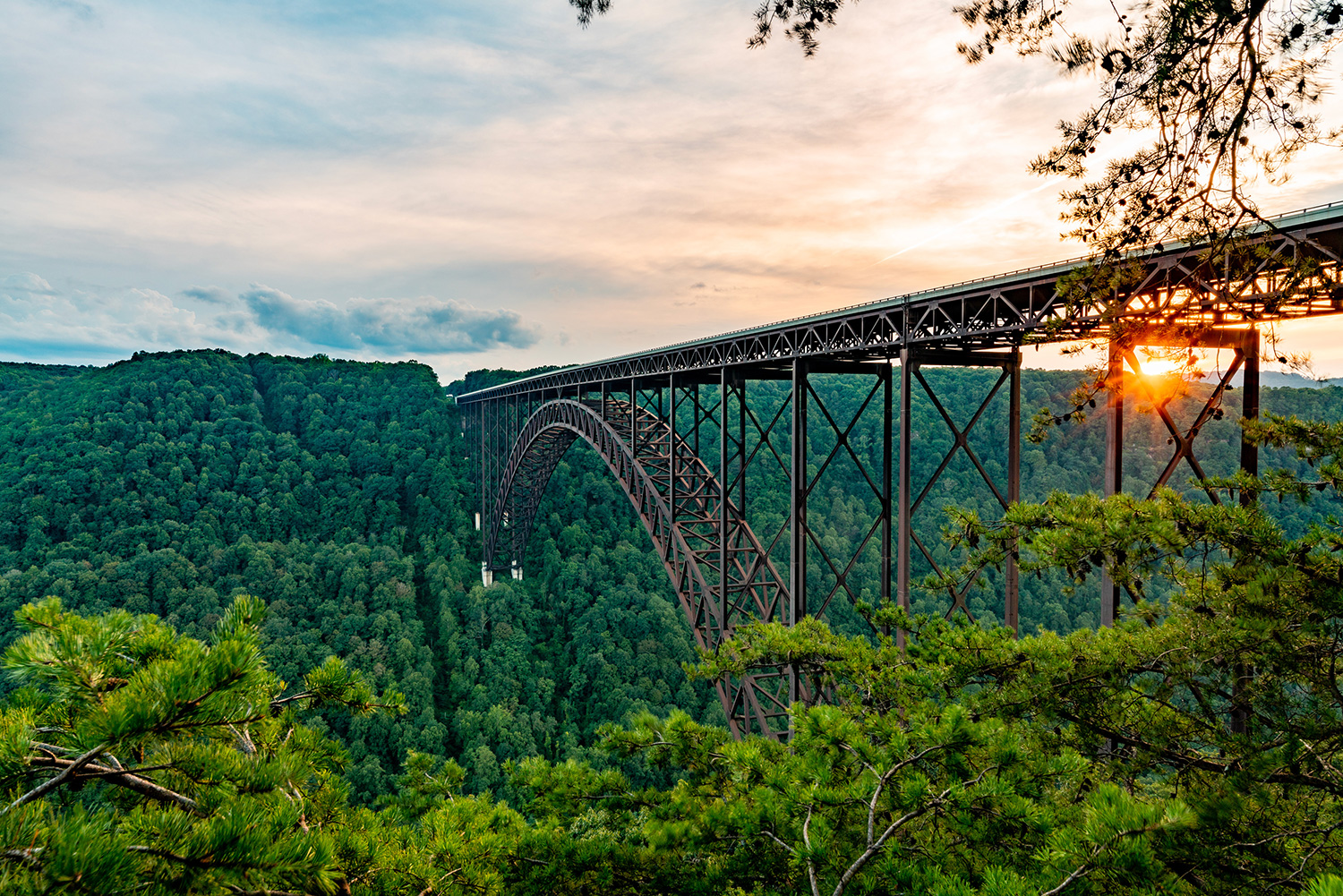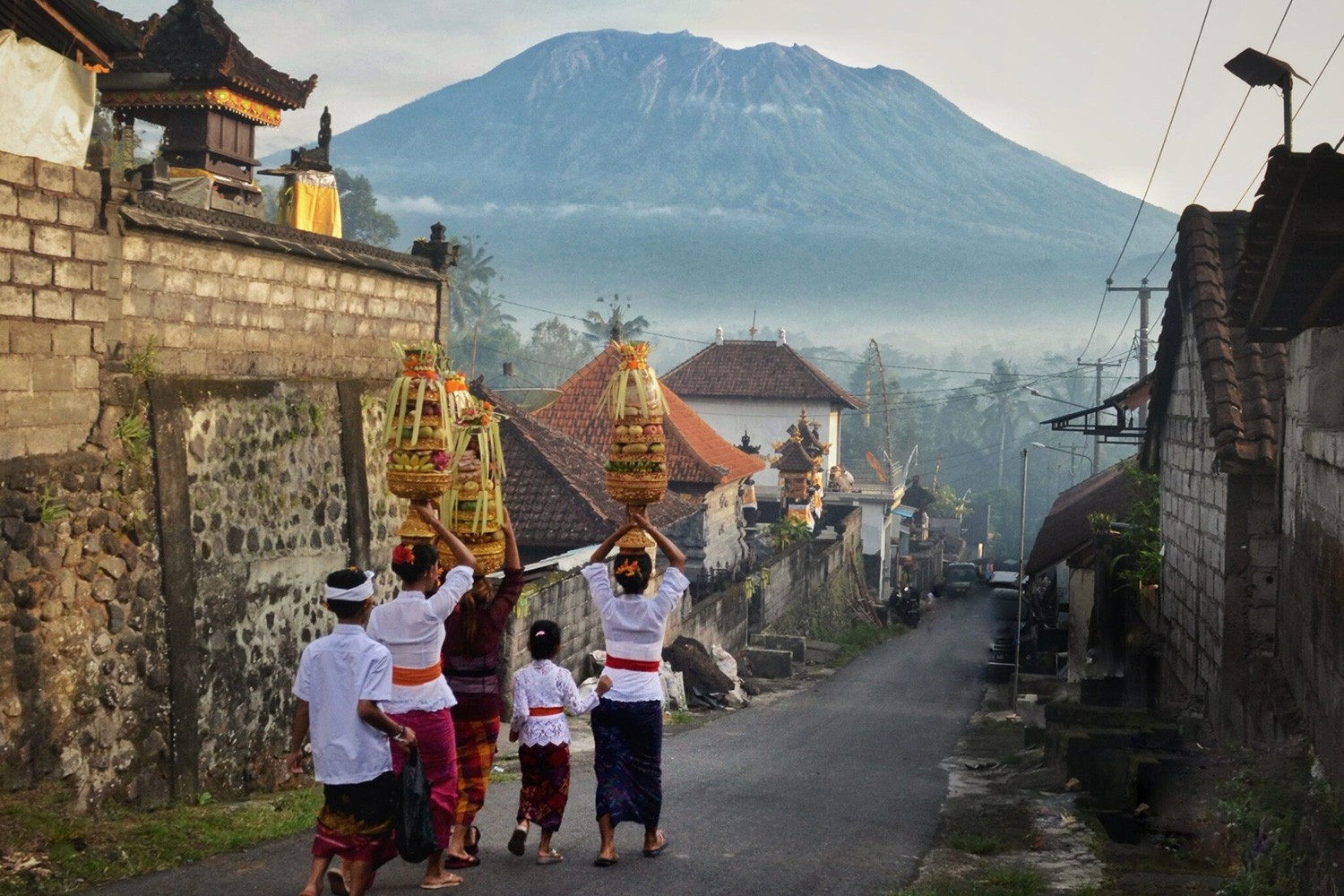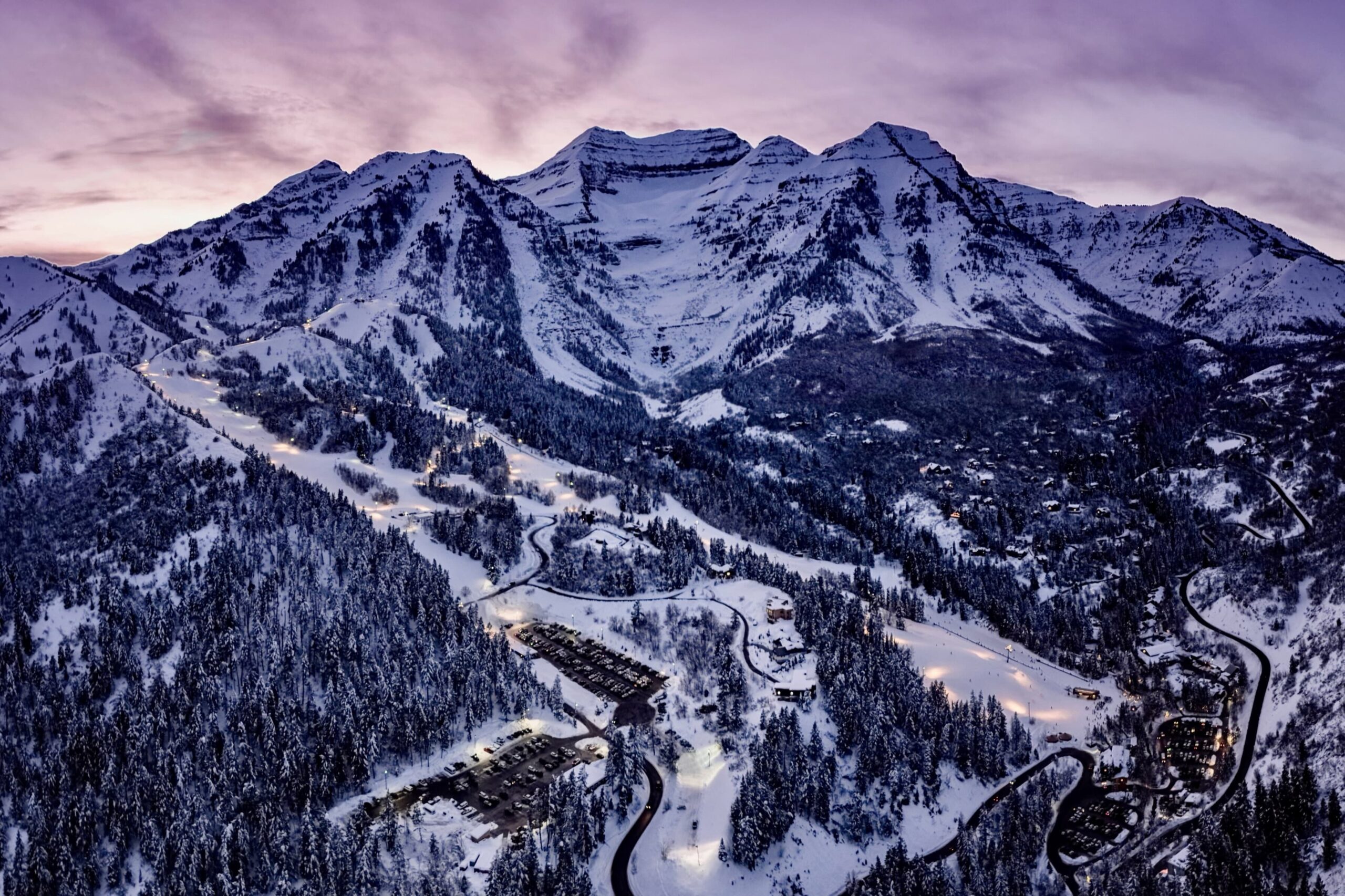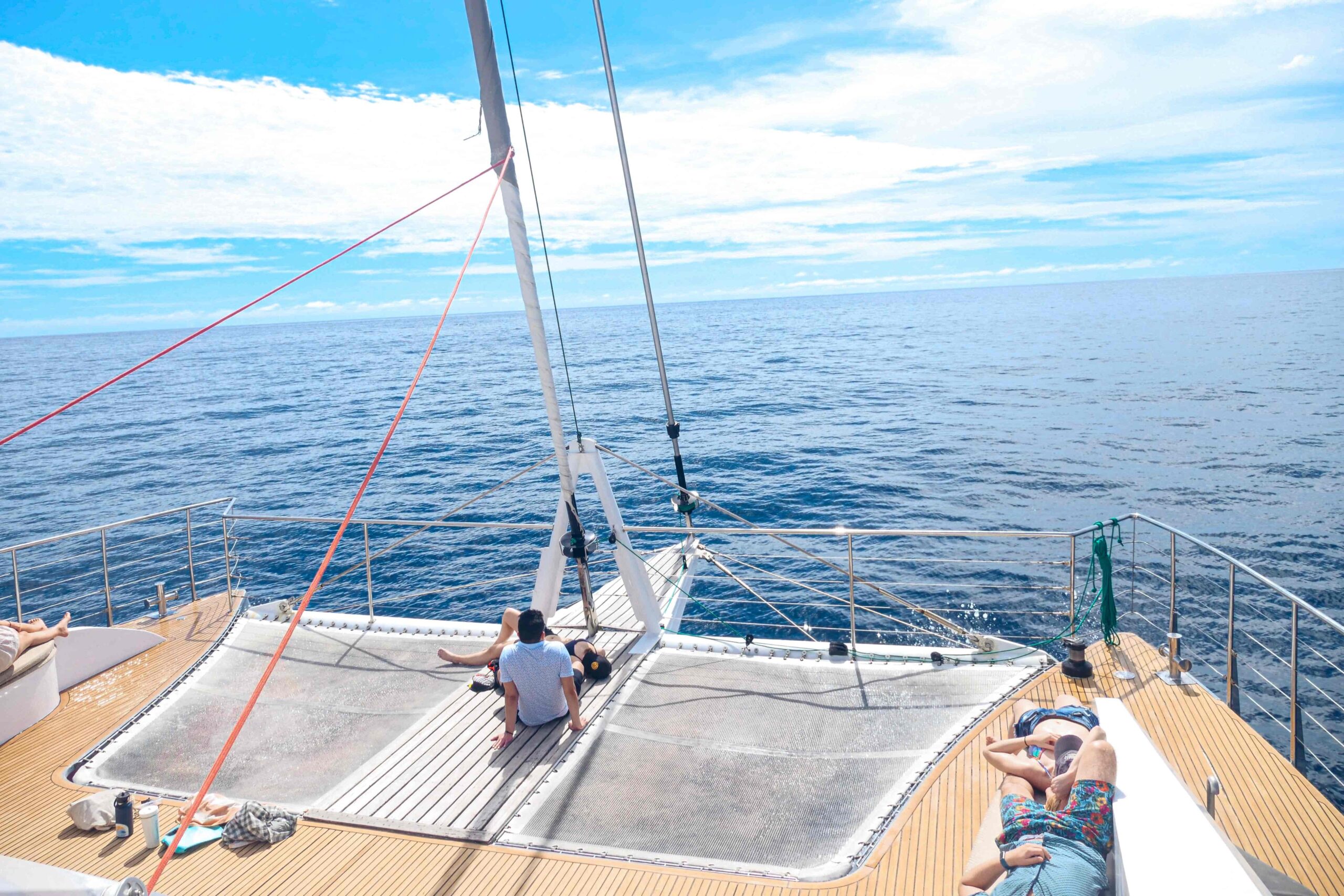NORTH STARS:
Water Management
Waste Management
Energy Efficiency
“Though the phrase ‘redefining luxury’ has been abused over the years, the concept springs to mind when staying at a Zannier property.”
The Azure Road Take
A short drive from Siem Reap, my tuk-tuk (or remorque in French) turns down a red dirt road. It’s the kind of dusty track that used to connect the old airport, the city, and the Angkor temple complex before the Cambodian government embarked on a paving mission during the pandemic. Minutes later, we pass through a wooden gate, revealing a small cluster of wooden houses surrounded by verdant foliage and fields. The hinterland retreat is Zannier Phum Baitang. Phum Baitang (which translates as green village), unfurls across 20 acres of gardens and rice paddies, distilling Khmer heritage into a setting of pared-back elegance.
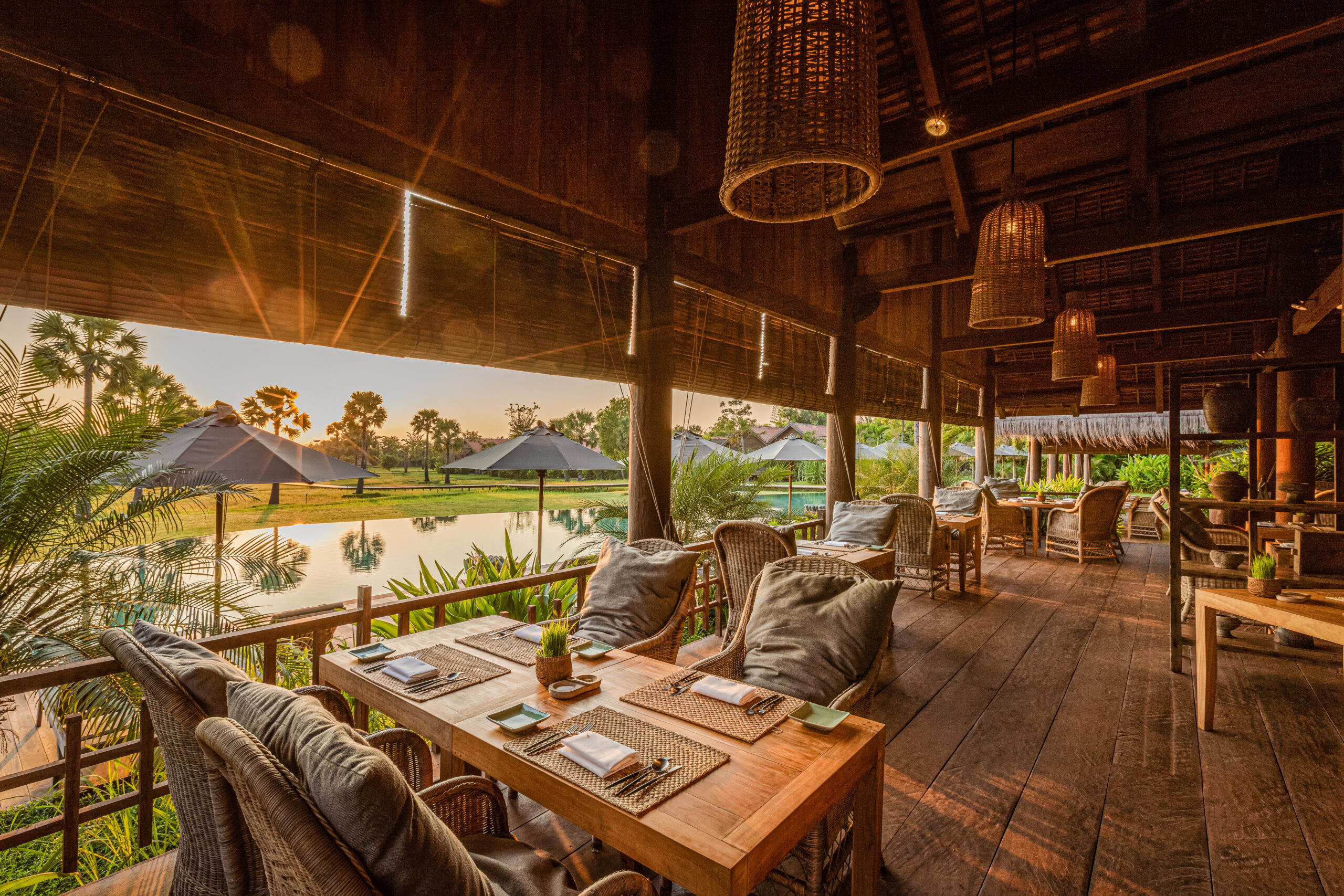
Bay Phsar Pool Restaurant. Courtesy of Patricia Parinejad
Who’s it for?
Travelers drawn to upmarket rural retreats. Couples seeking the romance and privacy of villas. Families looking for room to roam.
Sustainability Chops
Phum Baitang, which opened in 2015, was the second hotel from Arnaud Zannier. Like all Zannier hotels, the property has a deeply integrated sustainability program, starting with the renewal of its Green Globe certification in April 2023.
While there are too many initiatives to list, a few stand out. The property’s common spaces and villas use long-lasting bulbs to reduce energy consumption. Décor features artwork from regional artisans. For linen textiles, the management team purchases large rolls from wholesalers and produces various pieces in-house, from uniforms to tablecloths and napkins.
Bathrooms are stocked with refillable containers filled with natural, paraben- and ethanol-free products. In the boutique, guests can purchase locally made crafts.
The hotel sits on a working rice paddy, employing nearby residents both as staff and as seasonal workers to help with the harvest. The property’s organic rice supply supports the onsite restaurants and is available for guests to purchase as an edible souvenir.
For its bar and restaurant programs, Phum Baitang sources a significant portion of its ingredients from sustainable local suppliers. On the premises, an organic garden produces a variety of fruits (mangoes, bananas), vegetables, and herbs, supporting the resort’s farm-to-table ethos while reducing the carbon footprint of food transportation.
Waste reduction is also a priority. Phum Baitang processes approximately 45 pounds of food waste daily, repurposing organic scraps from the restaurants and staff canteen to feed animals.
The property avoids plastic and single-use items whenever possible. At the restaurants, guests will find linen napkins and lemongrass straws in place of disposable alternatives.
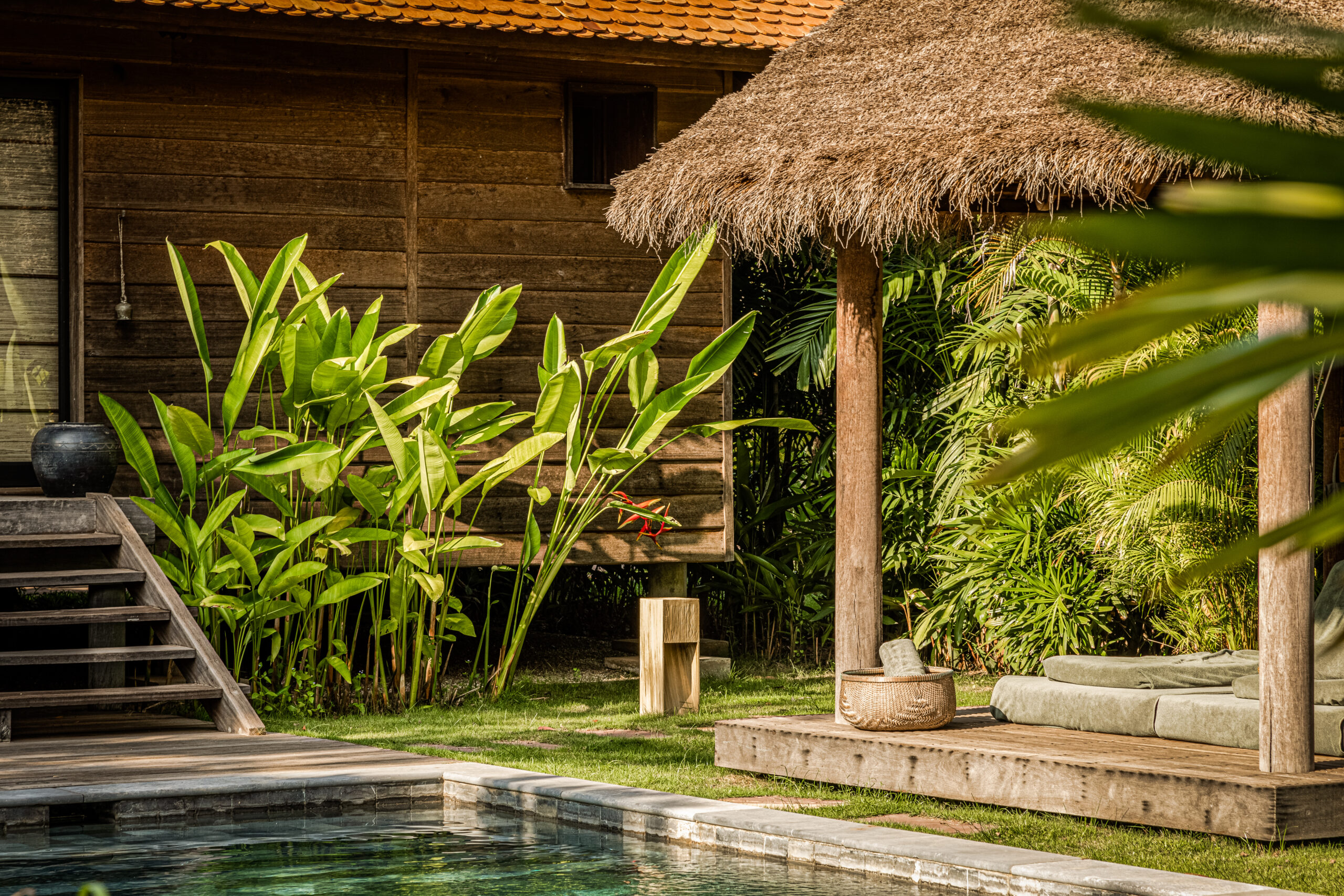
Pool Villa. Courtesy of Patricia Parinejad.
Composting plays a crucial role in the property’s circular operations. Staff convert organic waste, including leaves, plant trimmings, and straw, into nutrient-rich compost for the rice paddies and gardens.
The resort recycles used cooking oil through a collaboration with Naga Earth, which converts it into biodiesel. Additionally, staff collect used soap from guest villas and send it to the ECO Soap Bank Organization, which provides essential hygiene products to Cambodian families in need. Even damaged staff uniforms and linens are creatively repurposed to extend their use.
Another initiative worth noting is the resort’s autonomous water treatment plant, which ensures a clean, fresh water supply year-round. Drinking water is drawn from five wells and filtered through reverse osmosis before being bottled in reusable glass containers instead of plastic.
In the spa, products and oils are sourced from local suppliers in Siem Reap. Most feature natural and organic botanicals such as ginger, turmeric, anise, and kaffir lime, offering therapeutic benefits while aligning with the resort’s eco-conscious approach to wellness.
Location
Tucked on the outskirts of Siem Reap, the resort feels secluded yet within reach of the action. A short tuk-tuk ride leads to the city’s shops, riverfront, markets, and nightlife. Angkor Wat and the temples, the region’s key attraction, can be reached by private car or tuk-tuk within 25-30 minutes. The hotel arranges private half- and full-day tours or book a tuk-tuk directly through the front desk for the day and walk the temples at your leisure.
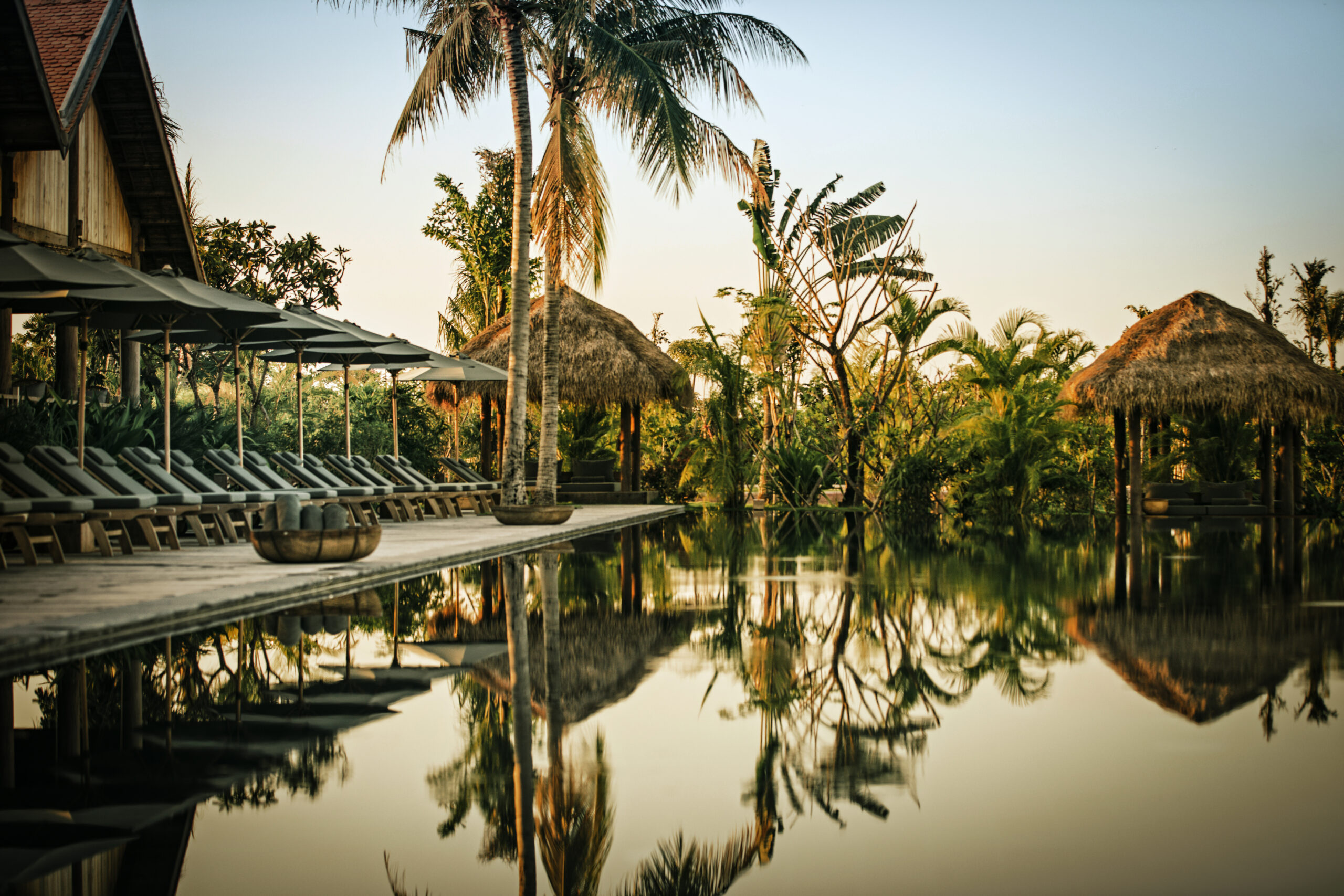
Zannier Phum Baitang Pool. Courtesy of Zannier Hotels.
Rooms
Each of the 45 villas—25 with private pools—echoes the design of a traditional Khmer home. Built from salvaged wood with thatched roofing, the stilted structures feature spacious, elevated wooden decks.
The interiors balance simplicity with thoughtful details that together give a deep sense of place. Accents of cotton and linen, handmade local furniture, dark wood floors, freestanding stone tubs, rough-hewn stone sinks, and antique Cambodian artifacts create warmth without excess.
Floor-to-ceiling windows frame views of the gardens and rice fields, blurring the line between indoors and out. At night, lanterns cast a soft glow, evoking the nostalgia of a bygone era.
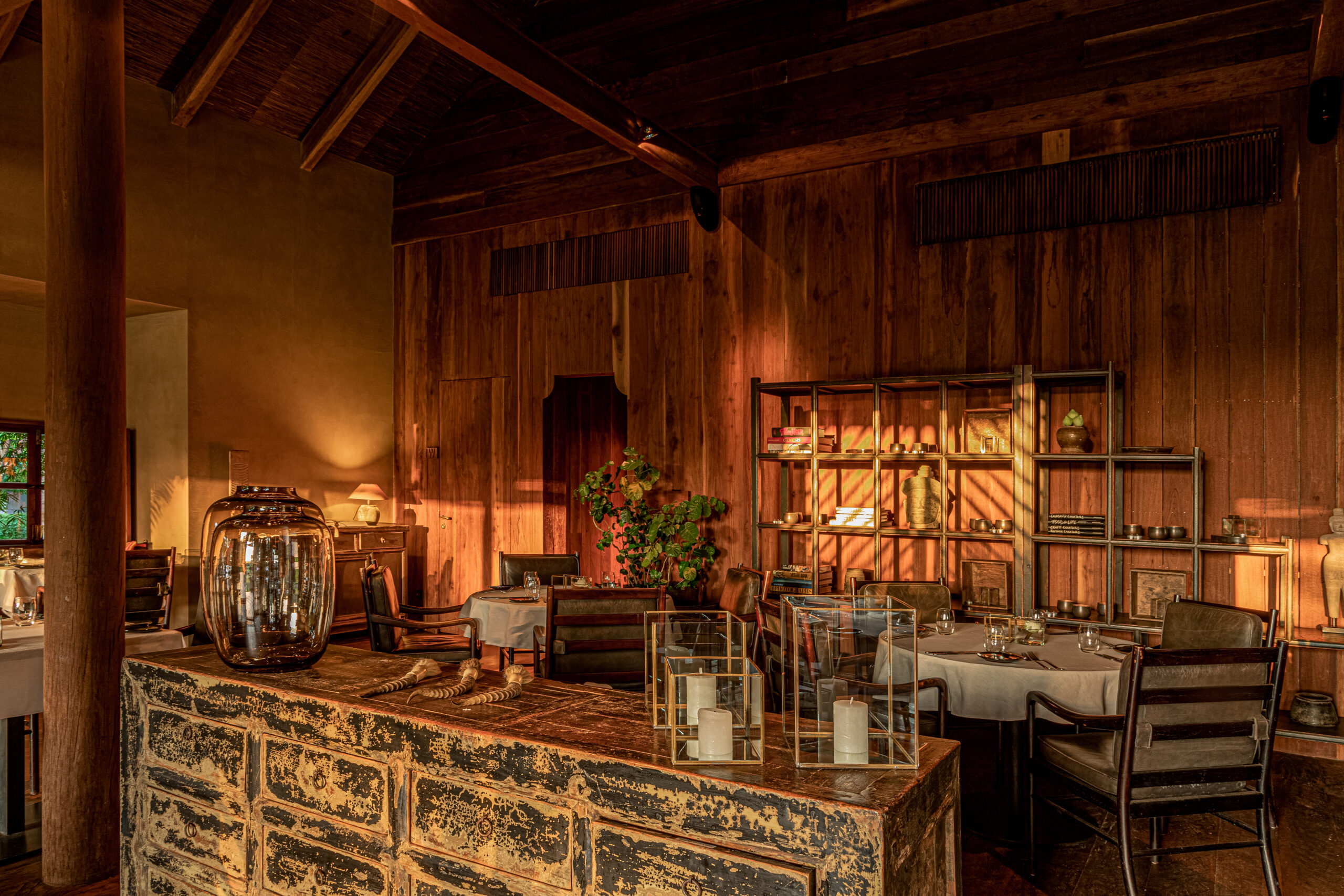
Hang Bay Restaurant. Courtesy of Patricia Parinejad.
Food and Drink
Executive Chef Kimchhoeung (Kim) Hin has been cooking since 2009. He began his career at La Résidence d’Angkor in his hometown of Siem Reap, spent four years at Constance in Seychelles, and joined Zannier Phum Baitang at its inception in 2015 as Chef de Partie.
Today, he leads the culinary team at Phum Baitang, blending respect for traditional Khmer flavors with a creative, modern approach. Over the past decade, he has shaped the resort’s culinary identity, most recently debuting a tasting menu inspired by his grandmother’s recipes.
At Hang Bay, the breezy fine dining restaurant, Chef Kim pairs handpicked ingredients from the property’s garden with aromatic spices to create deeply satisfying dishes. Highlights from the recent Khmer-inspired tasting menu include smoked duck salad, luscious sous-vide pork belly with green mango salad, and grilled crawfish atop mung bean gnocchi dressed in fragrant curry sauce.
Wine lovers have further reason to book a stay at Zannier properties: they feature wines from Domaines Roger Zannier. Hang Bay offers a curated wine pairing with the tasting menu, along with selections by the bottle and glass from the owner’s estates in Portugal, Italy, and France.
The resort’s more casual restaurant, Bay Phsar, offers a relaxed yet refined take on regional cuisine. Signature dishes include amok trey, a fragrant fish curry, and lok lak, a peppery beef stir-fry, both staples of Khmer cooking.
For lighter fare, the Pool Bar serves fresh fruit juices, mocktails, cocktails, and small plates such as vibrant salads, tropical fruit platters, noodles, and spring rolls. As the sun dips, the Sunset Lounge, set in a century-old farmhouse, is the place to be. Guests arrive early to snag a front-row seat to watch the sky transform from gold to fuchsia while sipping on Champagne, wine, cocktails, or puffing a premium cigar.
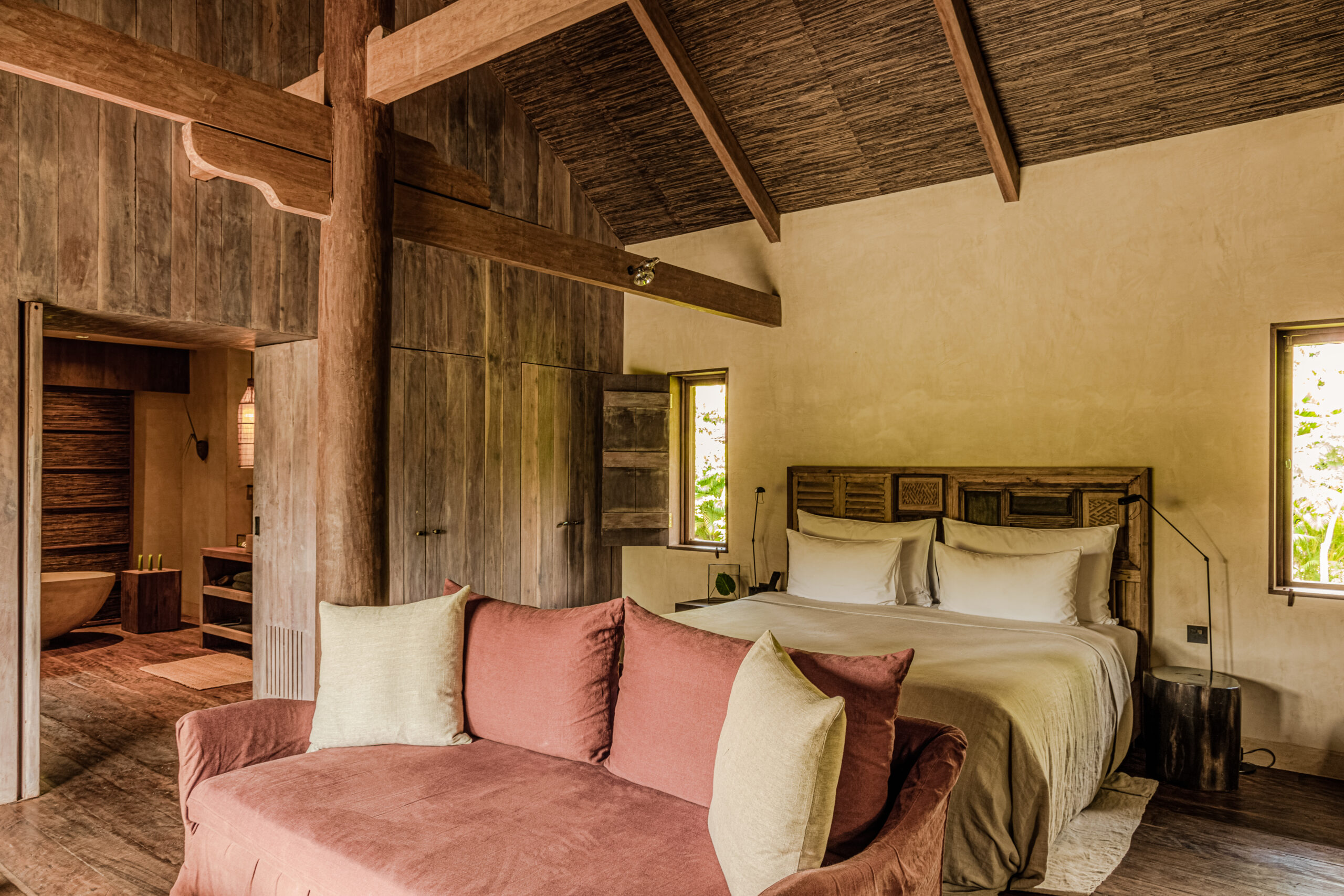
Terrace Villa. Courtesy of Patricia Parinejad.
Amenities
A tranquil 50-meter infinity pool stretches toward the rice fields. In the morning, it captures the reflection of passing clouds; come evening, it’s ablaze with the fiery colors of sunset. After a morning traipsing through temples, guests retreat to the pool for a dip, and to order a cocktail or two in one of the loungers.
Guests eager to stretch their legs can hop on a complimentary bike, whether for a lazy ride around the grounds or out into nearby villages. Other activities include hands-on cooking and mixology classes, excursions to local temples and markets, and a guided scooter ride to rural villages away from the tourist squads. A kids’ club provides activities for younger travelers.
Spa
The Temple Spa feels like a sanctuary within a sanctuary. Hidden behind the pool, a winding path nearly consumed by dense foliage leads to the entrance. As palms part like the Red Sea, a striking stone building emerges. It cuts a figure that’s reminiscent of Ta Prohm, the jungle temple tangled with strangler fig tree roots made famous by the film Tomb Raider. Whether intentional or not, the design evokes the thrill of a hidden discovery.
Upon arrival, guests are welcomed with a refreshing drink and cool towel before settling into the serene, airy space to browse the treatment menu. The spa’s healing therapies draw from global traditions, incorporating techniques from Cambodia, Tibet, Sweden, and China.
A stone path leads to a cluster of intricately carved treatment rooms surrounded by lotus-filled ponds. Many treatments incorporate locally sourced botanicals and essential oils, handcrafted in-house from organic ingredients grown in the spa’s own gardens.
Beyond massages, scrubs, and other body services, the spa serves as a holistic wellness retreat, offering nature-immersive excursions and a tailored nutrition program. Guests can deepen their experiences with yoga, meditation, sound healing, and chakra balancing — each practice designed to restore balance and well-being.
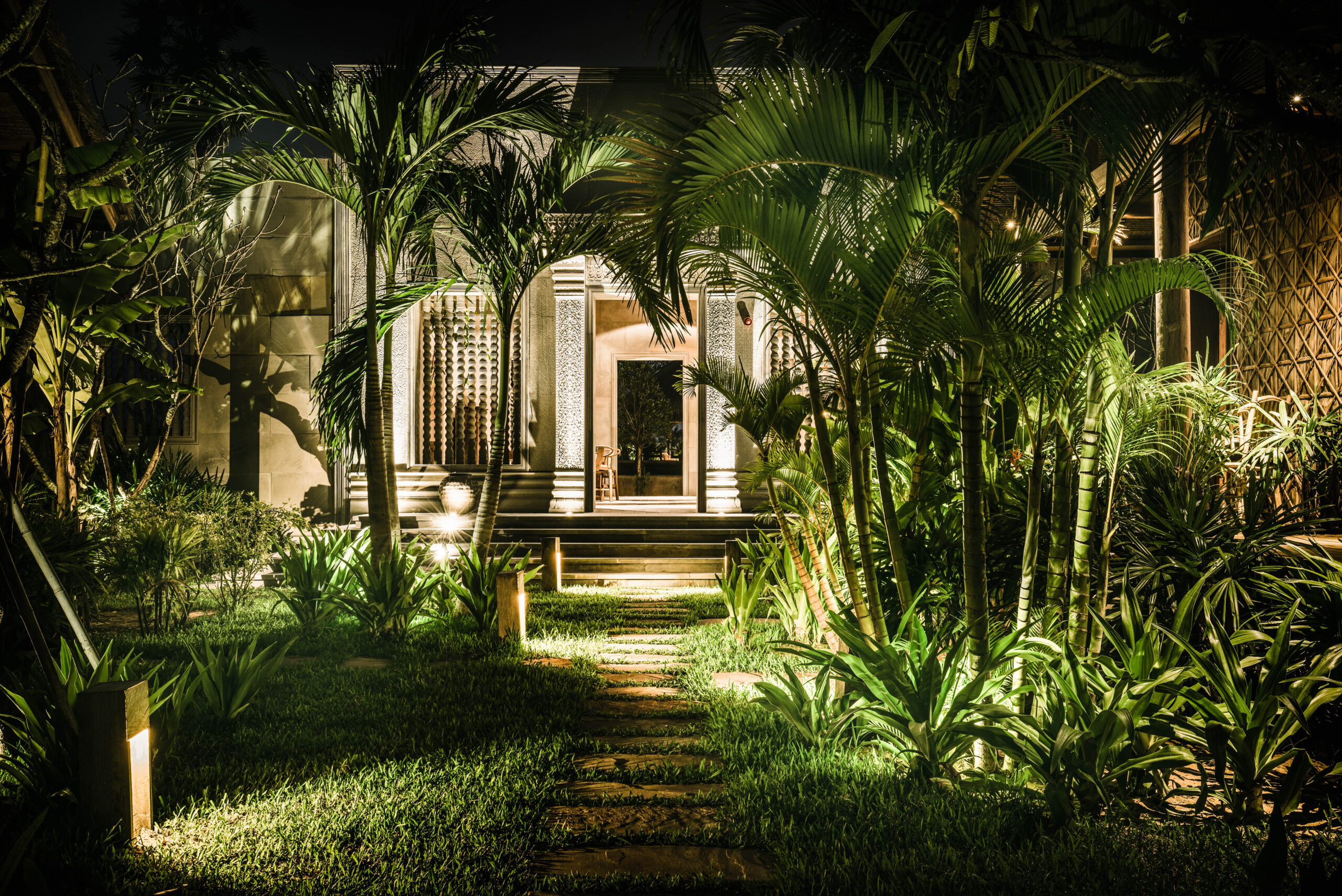
Temple Spa. Courtesy of Zannier Hotels.
The Verdict
Though the phrase “redefining luxury” has been abused over the years, the concept springs to mind when staying at a Zannier property. These hotels prove that modern luxury means transporting simplicity. Rather than the stark black and white oak hues of Scandinavian minimalism, however, Zannier borrows from the landscape and aesthetics of its location. In Cambodia, Phum Baitang offers a pastoral retreat where time slows, one’s blood pressure drops, and the body reverts to its natural Circadian rhythms – an achievement that, in today’s fast-paced world, feels truly luxurious.
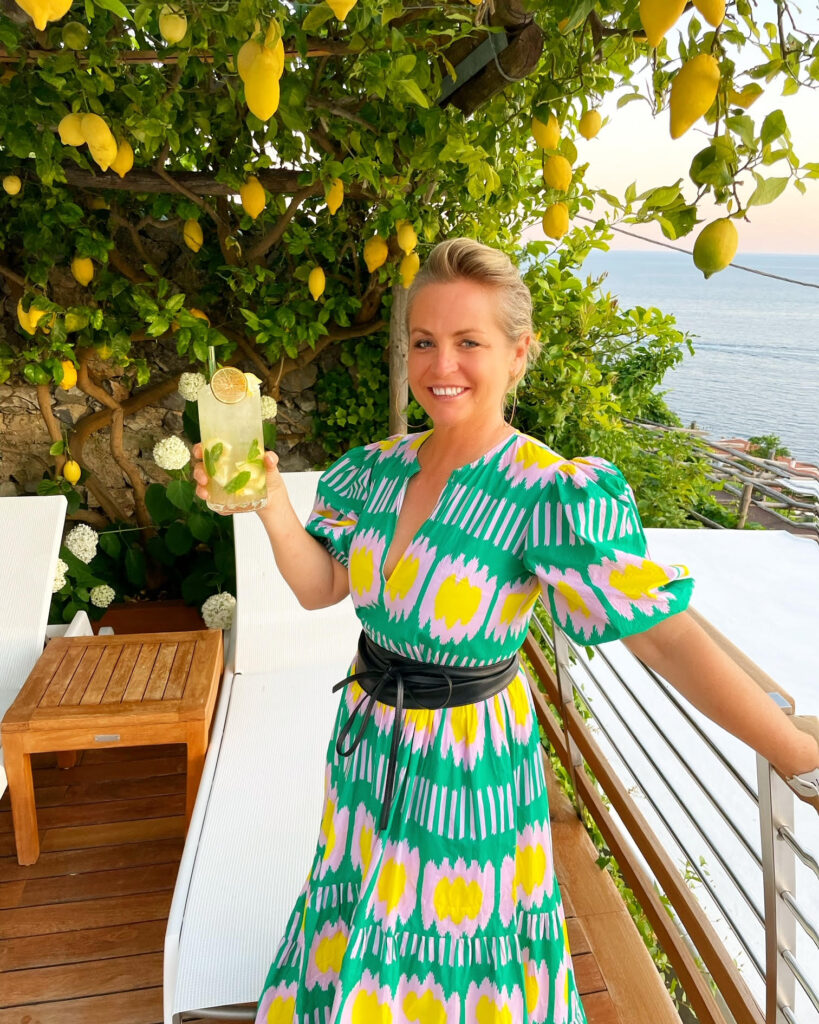
Founder and CEO of Azure Road, Lauren Mowery is a longtime wine, food, and travel writer. Mowery continues to serve on Decanter Magazine’s 12-strong US editorial team. Prior to joining Decanter, she spent five years as the travel editor at Wine Enthusiast. Mowery has earned accolades for her writing and photography, having contributed travel, drinks, food, and sustainability content to publications like Food & Wine, Forbes, Afar, The Independent, Saveur, Hemispheres, U.S. News & World Report, SCUBA Diving, Plate, Chef & Restaurant, Hotels Above Par, AAA, Fodors.com, Lonely Planet, USA Today, Men’s Journal, and Time Out, among others.
Pursuing her Master of Wine certification, she has also been a regular wine and spirits writer for Tasting Panel, Somm Journal, VinePair, Punch, and SevenFifty Daily. Mowery is a graduate of the University of Virginia and Fordham Law School, and she completed two wine harvests in South Africa.
Follow her on Instagram @AzureRoad and TikTok @AzureRoad
North Stars: Carbon Footprint, Energy Efficiency, Waste Management


